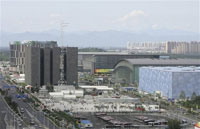Thousands of empty seats seen in Olympic venues
Despite boasts that all 6.8 million tickets have been sold for the Beijing Olympics, organizers have been forced to acknowledge thousands of empty seats with games volunteers being used to fill the void.

Meanwhile, ticket scalpers hover outside venues offering black-market tickets at prices that exceed the monthly income of many Beijingers.
Wang Wei, executive vice president of the Olympic organizing committee, estimated Tuesday that most venues were 70 percent to 80 percent full. However, the numbers seem to vary widely. Popular sports like basketball are well attended, but judo sessions - particularly preliminary rounds - are nearly empty.
Venues outside Beijing hosting football have been half full despite matches by Brazil's men, Germany's World Cup champion women and host China.
The empty seats shown on television are embarrassing to organizers, who have been calling the games - among other things - "the people's Olympics" and touting the widespread enthusiasm for an event that's supposed to showcase sparkling venues and China's rising economic and political power.
"We are concerned about these not-full stadiums," Wang said. "I think it is due to the weather conditions, the hot, humid weather and rain. ... I think from today there will be more spectators in the stadiums. The tickets are sold out, that's correct."
Wang said people may be using their tickets, but staying for only one session. In many events, a single ticket includes several sessions or games.
Wang acknowledged some rows of empty seats are being filled by volunteers - 70,000 are being used for the Olympics - who can be sent in to make attendance look better. Some unused tickets may have been given away by sponsors. And preliminary-round events may not attract many Chinese, particularly if China isn't involved.
Scalpers also appear to have purchased large blocks of tickets and can be seen openly hawking them outside venues for 20-30 times their face value.
Scenes at the west entrance of the 91,000-seat National Stadium - known as the Bird's Nest - were typical on Tuesday.
An Associated Press reporter watched as one scalper sold a 50 yuan ticket to fencing for 1,000 yuan (US$145) Another scalper sold tickets to the swimming final for 2,500 yuan (US$365) per ticket. A few steps away, tennis tickets were being offered for 2,000 yuan (US$295). In this case, one potential customer refused.
"What do you know about tennis," the scalper replied. "In Shanghai tennis tickets would sell for 20,000."
Ticket scalping is illegal in China, but three policemen in the area ignored the dozens of scalpers moving among hundreds of potential customers.
Police did stop Zhao Chun, who said he was a student from Beijing, from holding up a sign that read: "I need a ticket for track and field."
"I've been doing this for three days," Zhao said. "Many scalpers came to me but I couldn't afford the price. ... For that price I'd rather stay at home and watch TV."
Feng Chaogang faced similar frustration trying to get tickets for Monday's women's basketball showdown between the United States and China.
"From the TV broadcasts we can see lots of seats are empty," Feng said. He said he turned down chances to buy tickets being offered in the range of 2,000-3,000 yuan (US$295-440).
"We can't afford that and people like us who really want to see the games can't get in."
Police officials have told Chinese media that ticket scalpers can be detained for 10 to 15 days, but also raised the threat of re-education camps, where Chinese can be sentenced to manual labor without trial.
Asked if he were aware that tickets were being scalped, Wang, the Beijing organizing official replied: "Not really."
"Scalping is prohibited by Chinese law and we'll look into this to see whether it is true or not," he added. "From the test events until now we have implemented measures to prevent the scalping of tickets. That's all I can say."
Subscribe to Pravda.Ru Telegram channel, Facebook, RSS!


